
Resilient School of Medicine graduates encouraged to be healers who honor their patients’ humanity
May 10, 2024

May 10, 2024
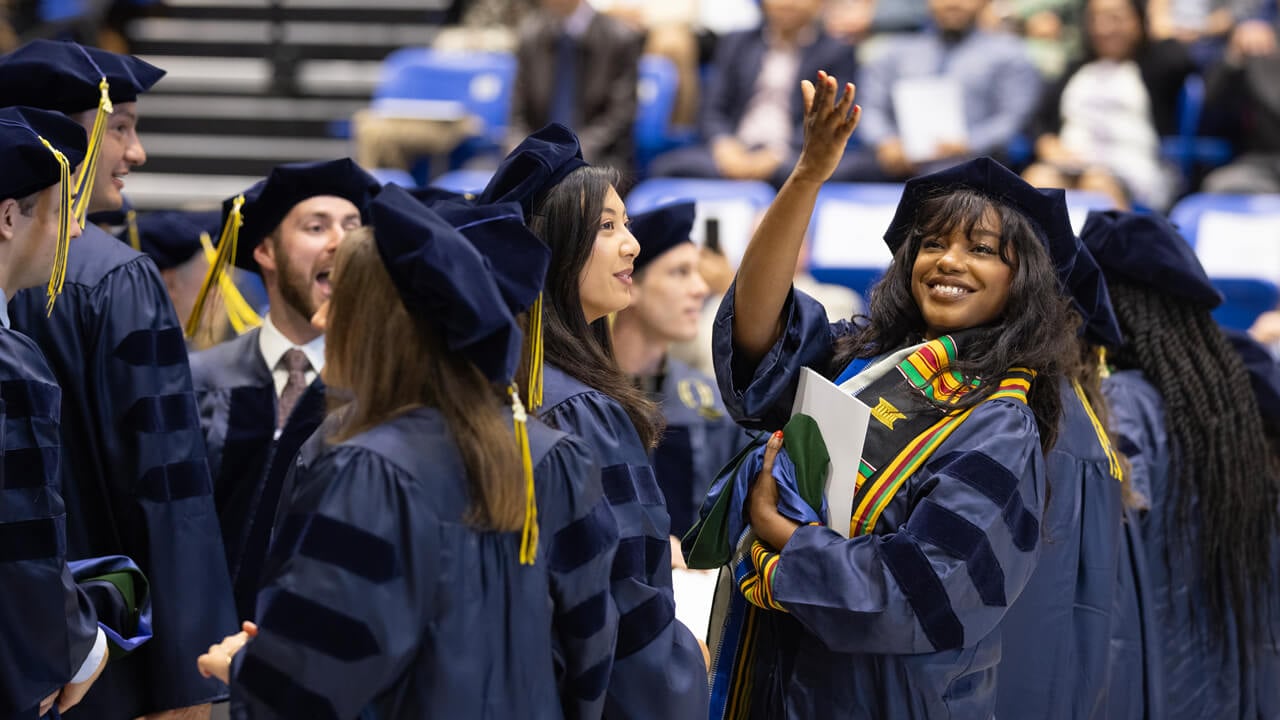
“You now hold the coveted title of ‘doctor,’” Juthani told the 93 graduates from the lectern at M&T Bank Arena on Friday afternoon. “No matter what your career holds, you will be a listener, a healer, a leader in your family and in your community. When people are suffering, they need to trust someone and they will depend on you. You will have the privilege to hear their most intimate thoughts and console them during their most vulnerable moments. Show compassion, and always honor their humanity.”
Representing a diverse cross-section of the population and set to embark on residencies spanning 22 states and 23 specialties, the graduates listened to a series of inspiring speeches before Lyuba Konopasek, MD, senior associate dean for education at the Frank H. Netter MD School of Medicine, led them in reciting the Quinnipiac Netter Physician’s Pledge.
President Judy Olian praised the graduates for how they “emerged stronger” from circumstances no medical students had ever faced and finished “on a high note, with a brilliant future ahead.”
“This has been quite a journey — one marked by pride and joy but also by more than a few twists and turns along the way,” Olian said. “I congratulate you — and I thank you — for adapting and adjusting with grace and generosity to, yes, we did have a pandemic. You weathered that period with strength and resilience. You supported each other and you supported communities around us.”
Juthani made history in 2021 when she became the first Indian American appointed to the DPH commissioner role. Her groundbreaking work in the study and treatment of infectious diseases saw her emerge as one of the state’s leading voices in response to the COVID-19 pandemic, which coincided with a time when the Netter graduates embarked on their unconventional journey as first-year medical school students.
They should be commended, she said, for adapting to a remote environment that saw them miss out on the in-person pageantry of a White Coat Ceremony and other milestones directly impacted by the pandemic.
One student, Hannah Lahey, MD ’24, told Juthani that bonds were strengthened by “learning in pods” and other innovative measures the School of Medicine faculty implemented on the fly.
Recalling the first wave of the pandemic and its inherent uncertainty, Juthani — a “trailblazing professor,” researcher and former fellow at the Yale School of Medicine, as Olian put it — said it was her savvy and steady presence as a physician that ultimately led to her getting the call from Connecticut Gov. Ned Lamont to serve as DPH commissioner. She said the patients she encountered made the pandemic more tangible, and telling their stories resonated more with Connecticut residents than any data points could.
“It was an unprecedented administrative challenge to leverage the expertise of a small group of infectious disease fellows and faculty,” Juthani said. “I had a job to do. So, I did it. I held Zoom rounds daily to help answer questions from hundreds of doctors from various specialties trying to care for COVID patients. I spent hours responding to media requests to help educate the public as well. We all banded together and made it through the first wave.”
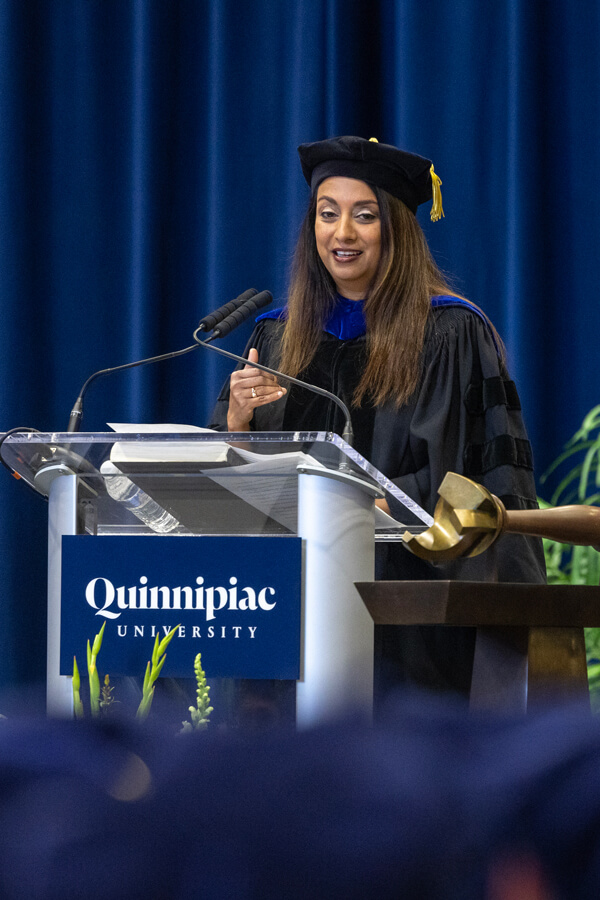
One of the first textbooks Juthani opened as a medical student contained the work of Netter, “the Michelangelo of medicine” for whom each new Netter graduate has “the honor to bear his name on your diplomas,” she said. She concluded her speech with an impassioned plea on behalf of Connecticut, where a physician shortage is expected.
“For those who are staying in Connecticut, we are thrilled,” Juthani said. “For those of you who are leaving us, consider coming back after residency to help keep Connecticut healthy. For me, the entire state of Connecticut is my patient. Join me in fighting to ensure that health is a human right for all residents.”
Her closing statement elicited hearty cheers from the crowd of family and friends gathered in the arena to witness this pivotal moment for the graduates.
“Although you didn’t get a chance to don a white coat at the beginning of your journey,” she said, “you have earned the right to wear that white coat with pride every day going forward.”
Dean Phillip Boiselle, MD, praised the graduates for their “grace and grit” with which they navigated the challenges of the past four years, preparing them to uphold the school’s vision of “painting a brighter and more equitable healthcare future for all — one patient at a time.”
He said the pandemic exposed and exacerbated long-standing health inequities and disparities and tested the resilence of our healthcare organizations and healthcare providers like never before.
“You are graduating into a world that desperately needs doctors just like you,” Boiselle said. “Physicians who are compassionate, curious, dedicated, empathetic, equity-minded, humanistic, humble, innovative, patient-centered, resilient, respectful and team-oriented. That is quite a list — and as Quinnipiac Netter grads, you embody all of these qualities and more!”
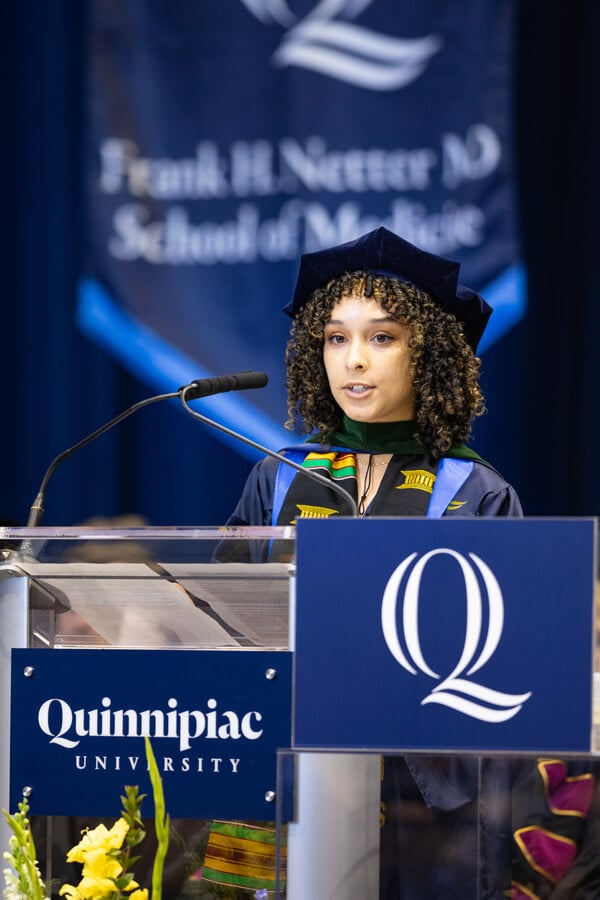
After degrees were conferred, Madison Masters, MD ’24, delivered the student address. Masters, who served as class president for four years, acknowledged her parents and grandparents in the audience, recalling how she first learned to “leave each place a bit better than I found it” on family hiking trips. She called upon her classmates to treat their new profession the same way.
“I know our career path is exhausting, and primes us to be rule-followers, and not to rock the boat,” Masters said. “And by the time training is finished, and attending-hood cradles us safely in its arms, we will be so, so tired. Even so, when that time comes, I hope you will recognize how much power we hold, together. The lives and livelihoods of our patients and our colleagues depend on us. I hope you will pick up a piece of trash on your hikes.”
Rebecca Zhoujie Fang, MD ’24, performed the national anthem after an introduction from Provost Debra Liebowitz, who introduced President Olian. Jeanne Doherty ’94, a member of the board of trustees and the alumni association board, delivered the alumni welcome address.

Pomp and Circumstance, Sir Edward Elgar
Debra J. Liebowitz, PhD
Provost
Rebecca Zhoujie Fang, MD ’24
Judy D. Olian, PhD
President
Phillip M. Boiselle, MD
Dean of the Frank H. Netter MD School of Medicine
Lyuba Konopasek, MD
Senior Associate Dean for Education
Manisha Juthani, MD
Commissioner, Connecticut Department of Public Health
Phillip M. Boiselle
Renu Boatright, MD
Assistant Dean for Student Affairs
Judy D. Olian
Madison Masters, MD ‘24
Lyuba Konopasek
Jeanna Doherty ’94
Trustee and Alumni Association Board
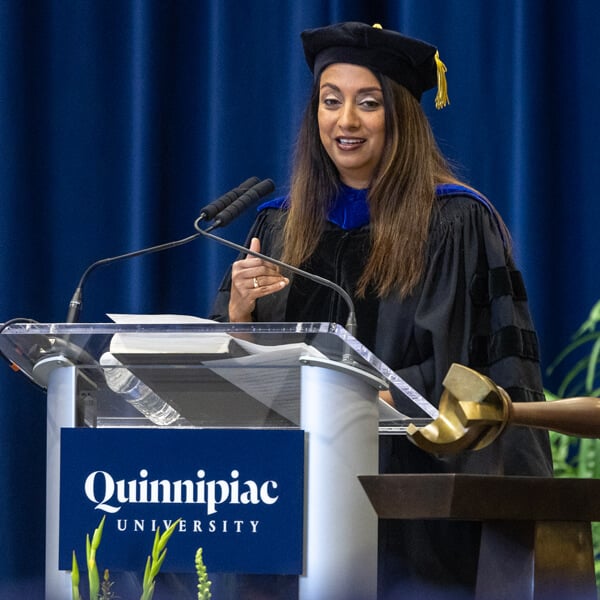
Commissioner of the Connecticut Department of Public Health
Frank H. Netter MD School of Medicine Ceremony | Friday, May 10, 1 p.m.
Manisha Juthani, MD, became the first Indian American to serve as commissioner of the Connecticut Department of Public Health upon her appointment in 2021. She came to Connecticut in 2002 to serve as an infectious diseases fellow at the Yale School of Medicine and eventually served as director of the Infectious Diseases Fellowship Program from 2012-21. She also took on the role of associate program director for career development in the Internal Medicine Residency Program at Yale from 2017-21, and she remains a professor of medicine at the university. Her groundbreaking work in the study and treatment of infectious diseases saw her emerge as one of the state’s leading voices in response to the COVID-19 pandemic. Additionally, Juthani has championed a number of public health causes in her post as DPH commissioner, including the opioid crisis, lead abatement, gun violence, maternal health and mental health. She received her bachelor’s degree from the University of Pennsylvania and her medical degree from the Weill Cornell Medical College.

Congratulations to the Class of 2024 as you celebrate the culmination of four years of hard work and a steadfast commitment to your dream. As you embark on residencies in 24 states and 16 different specialties and subspecialties, you are well prepared to be leaders in your community and to practice truly compassionate, patient-centered healthcare.
As graduates of Quinnipiac University’s Frank H. Netter MD School of Medicine, you have learned from a distinguished faculty and a committed staff. You also have learned valuable lessons from each other during this transformative time. Please stay connected to the QU Netter community and continue to enjoy the many friendships and mentorships you have nurtured here.
Your talent, drive and purpose are sure to impact many and to make the world a better and more equitable place for all. Enjoy this day with your families, friends and others who have helped you reach this milestone. Together, we are cheering for you, with utmost pride.
Warmly
Judy D. Olian
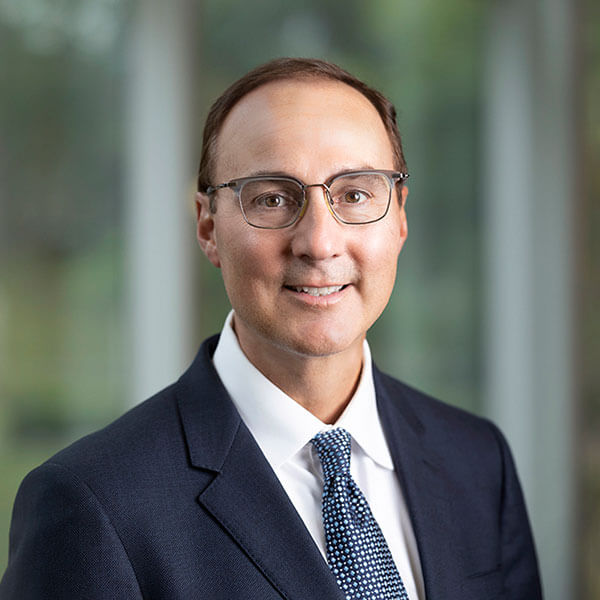
Congratulations to the Class of 2024 on your remarkable achievement!
Four years ago, you entered medical school amid a global pandemic. Individually and collectively, you have successfully met a series of unprecedented challenges with an admirable combination of grace and grit. At every step, you kept your focus on caring for our patients, our community and one another.
You are graduating at a watershed moment of opportunity for greater health equity and are poised to help lead these efforts in the communities in which you serve. As you go forth as doctors, you will help fulfill our school’s vision of painting a brighter and more equitable healthcare future for all — one brushstroke and one patient at a time.
No matter where your future career paths take you, you will always be part of our QU Netter family! Please share news of your successes and allow us to support you on your respective journeys.
Good luck and Godspeed!
Phillip Boiselle, MD
AS A MEMBER OF THE MEDICAL PROFESSION:
I SOLEMNLY PLEDGE to dedicate my life to the service of humanity;
THE HEALTH AND WELL-BEING OF MY PATIENT will be my first consideration;
I WILL RESPECT the autonomy and dignity of my patient;
I WILL MAINTAIN the utmost respect for human life;
I WILL NOT PERMIT considerations of age, disease or disability, creed, ethnic origin, gender, nationality, political affiliation, race, sexual orientation, social standing or any other factor to intervene between my duty and my patient;
I WILL ADVOCATE for social, economic, educational, and political changes that ameliorate suffering and contribute to the well-being of my patients and the communities I serve;
I WILL RESPECT the secrets that are confided in me, even after the patient has died;
I WILL PRACTICE my profession with conscience and dignity and in accordance with good medical practice;
I WILL FOSTER the honor and noble traditions of the medical profession;
I WILL GIVE to my teachers, colleagues, and students the respect and gratitude that is their due;
I WILL SHARE my medical knowledge for the benefit of the patient and the advancement of healthcare;
I WILL ATTEND TO my own health, well-being, and abilities in order to provide care of the highest standard;
I WILL NOT USE my medical knowledge to violate human rights and civil liberties, even under threat;
I MAKE THESE PROMISES solemnly, freely, and upon my honor.
Adapted from the WMA Declaration of Geneva Updated October 2017 (The Physician’s Pledge) and the AMA Declaration of Professional Responsibility
The 12th and 13th centuries saw the formation of universities under the jurisdiction of the Church. Most students of the day were clerks in the Holy Order, monks or priests. Cowls or hoods adorned their habits and protected the young scholars from harsh weather and the pervading dampness of the stone buildings in which they studied. Hoods also served to cover tonsured heads before the use of the skullcap.
Today, the cap, gown and hood have taken on a symbolic meaning. Color and shape conform to an academic code signifying a university’s conferral of the degree and the nature of the degree conferred. Gowns for the doctoral degree carry velvet panels and three horizontal velvet bars on the upper arm of the full, round, bell-shaped sleeves.
The mace — a symbol of authority — has antecedents in both Roman and Medieval history. The Roman mace (fasces) was carried by a lictor before the chief magistrate of the city, as well as before the legions. During the Middle Ages, the mace (mateola), a weapon of war, became first a symbol of victory and then a symbol of authority. The mace emblazoned with the Great Seal of England became a symbol of authority in Parliament by the end of the 13th century. It is this form of the mace that was the prototype of those symbols of authority, not only of legislative bodies, but also of cities and universities.
In 1246, following some 20 years of strife, the University of Paris was finally conceded the right to its own common seal. Since then, the use of the seal engraved on the mace has come to symbolize the authority of the academic community. In July 2000, Quinnipiac commissioned the noted sculptor Robert Meyer of Westport, Connecticut, to design and execute a new mace for Quinnipiac University. Cast in bronze, the mace incorporates elements of the university seal.
The medallion (medal of office), like the mace and the seal, is also a symbol of authority. It is possible that its roots may be traced back to the Roman “bulla” (a gold amulet of honor). The obverse of the medallion shows the seal of the office the wearer holds — in our case, the seal of the university. Not infrequently, the reverse would show the personal seal or coat of arms of the bearer. Since the High Middle Ages, the medallion has been worn by such officials as the chancellors of England, mayors of cities, and rectors of universities, and came to signify the high personal position such figures occupied in their respective governments. During the Renaissance, medallion design reached unique artistic heights, and in certain portraits the medallion was given particular prominence. The medallion is worn by the university’s president. The Quinnipiac medal showcases the university seal, sculpted in relief and cast in bronze.
Quinnipiac Today is your source for what's happening throughout #BobcatNation. Sign up for our weekly email newsletter to be among the first to know about news, events and members of our Bobcat family who are making a positive difference in our world.
Sign Up Now